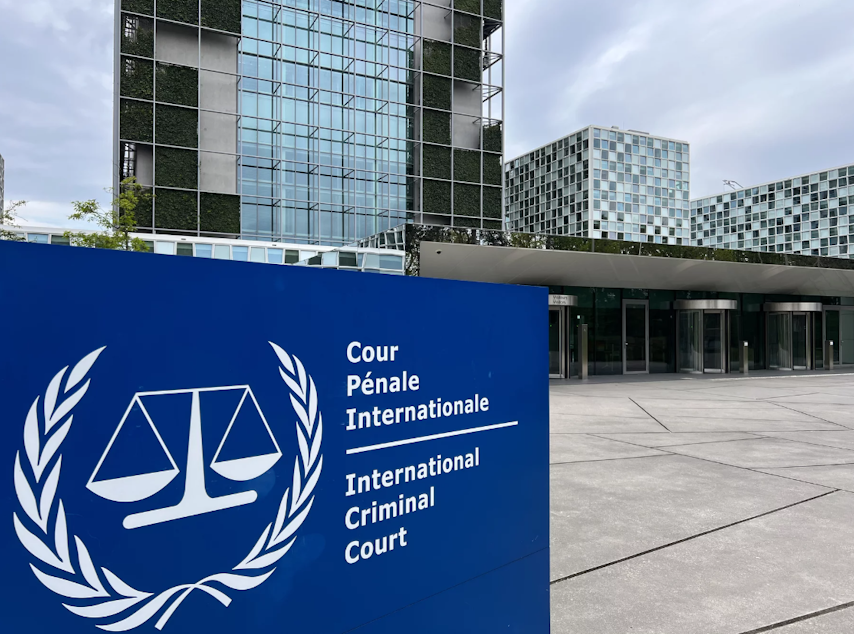The International Criminal Court is seeking warrants for Israeli and Hamas leaders

LONDON — The chief prosecutor at the International Criminal Court in The Hague said Monday he will seek arrest warrants for top leaders from both Israel and Hamas.
ICC Prosecutor Karim Khan has asked for warrants for Israeli Prime Minister Benjamin Netanyahu and Defense Minister Yoav Gallant as well as the leader of Hamas in Gaza, Yahya Sinwar, and two other senior Hamas officials.
Khan has submitted an application with the ICC's panel of judges to issue the warrants. He says Hamas' attacks of last Oct. 7 and the ensuing violence since are the basis for these warrants he's requesting from the court.
He said that an initial investigation by his prosecutorial team has indicated that war crimes and crimes against humanity have been committed, and continue to be committed, by both sides in the Gaza conflict.
The charges Netanyahu and Gallant could face for their role in Israel's current Gaza military campaign include international attacks on a civilian population, murder, persecution, and starvation. Khan said the Israeli state under Netanyahu and its military under Gallant have deprived civilians in Gaza of "all objects indispensable to human survival."
Sponsored
Israel is not a party to the international treaty that governs the International Criminal Court, known as the Rome Statute, and from which Khan as prosecutor derives his legal power.
But the court has previously ruled it maintains legal jurisdiction over the Palestinian territories, including the Gaza Strip, because Palestinian political leaders agreed to grant the court such jurisdiction.
The U.S. and the European Union have designated Hamas as a terrorist organization. Khan says that Sinwar, as the group's most senior leader in Gaza, should face trial for war crimes and crimes against humanity. He is seeking Sinwar's arrest along with Hamas' top military leader, Mohammed Diab Ibrahim Al-Masri, and the group's top political figure, Ismail Haniyeh.
Diab — who is known as "the guest" for his habit of staying in a different home every night to avoid detection — and Sinwar are both believed by Israel to be in Gaza. Haniyeh, who learned three of his sons and four grandchildren were killed by an Israeli airstrike last month, is based in Qatar's capital Doha.
Khan says all three men participated in crimes that include extermination, rape, murder, and hostage-taking during the Oct. 7 attacks.
Sponsored
In a statement, President Biden called the application for arrest warrants against Israeli leaders "outrageous," saying, "And let me be clear: whatever this prosecutor might imply, there is no equivalence — none — between Israel and Hamas. We will always stand with Israel against threats to its security."
Also in a statement, Secretary of State Antony Blinken said the U.S. "fundamentally rejects" the call for arrest warrants. He said the move could jeopardize diplomacy for a cease-fire and a hostage deal between Israel and Hamas.
If the judges at the International Criminal Court consider Khan's requests for the warrants are justified and decide to issue them, it could technically mean that if any of the five men travel to one of more than 120 countries that are party to the Rome Statute, they could be arrested and shipped for trial at The Hague. Qatar is not a signatory to the statute. Neither is the U.S.
Khan and his prosecutorial team have faced significant pressure from Washington in recent months to avoid requesting warrants against Netanyahu and Israeli officials in particular. Some members of Congress have repeatedly threatened to punish the prosecutor and other court officials if they investigate the United States or its allies, with certain members proposing legislation recently to address this.
Although Israel's government does not recognize the ICC, responses to the prosecutor's move suggest an acknowledgment of its significance, and there is anger that Israel's democratically elected leadership had been placed on a par with Hamas officials.
Sponsored
"There is no such comparison, we cannot accept it and it is unforgivable," said Yair Lapid, one of Netanyahu's most vocal critics and a major political opponent. He called the decision "a terrible political failure."
Israeli President Isaac Herzog called Khan's announcement "beyond outrageous," saying that it "shows the extent to which the international judicial system is in danger of collapsing."
Previous heads of state to face ICC warrants have included Russian President Vladimir Putin, indicted for seizing Ukrainian children, the late Muammar Gaddafi from Libya, and former Sudanese leader Omar al-Bashir, who was accused of genocide.
In a statement responding to Khan's announcement, Hamas said Netanyahu and his defense minister were "proven involved in committing the crime of genocide, aggression and crimes against humanity" against Palestinians, and the warrants for their arrest and detention had come "seven months late."
But Hamas strongly condemned attempts by Khan to seek arrest warrants for its leaders, which it said "equate the victim with the executioner." It argued that Hamas leaders were operating under a right afforded occupied peoples by international treaties to resist occupation in all forms, "including armed resistance."
Sponsored
The statement called for more arrest warrants against Israeli officials and military officers, and the cancellation of warrants for Hamas members.
Michele Kelemen contributed to this story from Washington, D.C. Lauren Migaki contributed from Tel Aviv. Teri Schultz contributed from Brussels.
[Copyright 2024 NPR]



